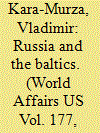|
|
|
Sort Order |
|
|
|
Items / Page
|
|
|
|
|
|
|
| Srl | Item |
| 1 |
ID:
122128


|
|
|
|
|
| Publication |
2013.
|
| Summary/Abstract |
If the level of domestic political repression in Vladimir Putin's Russia has not yet reached the scale of that in the Soviet Union-though several dozen Russian political prisoners are being held behind bars on fabricated charges-the level of officially sanctioned anti-Western agitation, and anti-Americanism in particular, is certainly comparable to the worst years of the Cold War. Hardly a day goes by without hate-filled reports on state television. Regime officials and senior legislators angrily accuse the United States of "interfering in Russia's internal affairs" through its supposed proxies inside the country, by which they, of course, mean Russian human rights groups and other nongovernmental organizations that are critical of the Putin regime. All NGOs that receive funding from abroad are required by a new law to label themselves as "foreign agents" (which, in the Russian public discourse, is synonymous with "spies") or face closure. Needless to say, these groups have refused to comply. (How could, for instance, Memorial, an organization co-founded by Andrei Sakharov to perpetuate the memory of victims of political repression, declare itself a "foreign agent"?) As a consequence, prosecutors are conducting disruptive raids on the offices of Russia's leading human rights groups, which they charge with violating this law.
|
|
|
|
|
|
|
|
|
|
|
|
|
|
|
|
| 2 |
ID:
141405


|
|
|
|
|
| Summary/Abstract |
MOSCOW — This may be hard to imagine, but there was a time when the national independence movements in the Baltic states had no greater ally than Russia, and its leader. As Soviet tanks rolled into Vilnius to crush Lithuania’s independence aspirations in January 1991, Boris Yeltsin—speaker of Parliament and head of state of the Russian Federation, then still a constituent part of the USSR—made a strong public stand against the Kremlin’s aggression and backed self-determination for the Baltic republics. In what Western diplomats—and many of his own supporters—considered a “crazy” move, Yeltsin then flew to the Estonian capital of Tallinn to sign a joint statement of mutual support with the leaders of the three Baltic states, as well as separate cooperation treaties with Estonia and Latvia, recognizing their “inalienable right to national independence” in an act that, in the opinion of many observers, prevented further bloodshed. While in Estonia, Yeltsin met with Soviet troops stationed there and urged them to disobey any orders from their Kremlin commanders to crush peaceful demonstrators. On the advice of friends, who had (well-founded) fears that the KGB might try to shoot down his plane, Yeltsin returned to Russia in a private car.
|
|
|
|
|
|
|
|
|
|
|
|
|
|
|
|
| 3 |
ID:
106730


|
|
|
|
|
|
|
|